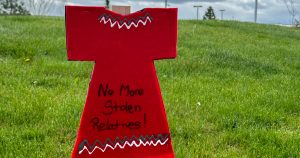SALEM – The Oregon House of Representatives unanimously approved legislation to make further refinements to the Oregon Indian Child Welfare Act (ORICWA), a top priority of the Confederated Tribes of the Umatilla Indian Reservation (CTUIR).
HB 3182, coming in at 168 pages, includes amendments to the ORICWA, which became law in 2020 when the CTUIR pushed for a state specific statute and partnered with a large workgroup to develop recommendations for the bill. They did this through HB 4214, which modified Oregon’s dependency code to conform to federal ICWA laws.
Board of Trustees member Cor Sams testified before the House Judiciary Committee in support of the bill on March 30. She explained the significance of the ORICWA to ensure compliance with the federal law and said, “we believe it will prove to be effective in reducing the disproportionate treatment of Native American children in the state’s child welfare system. We have already seen great strides taken by Child Welfare in improving the handling of ORICWA cases, from improving the state’s inquiry and notification process to a better understanding of what it means to provide active efforts and coordinate with tribal nations on cases.”
This session, the new bill will make a number of technical fixes including language regarding private adoptions and tribal customary adoptions. According to Brent Leonhard, Associate Attorney General from the CTUIR Office of Legal Counsel, a primary goal is to ensure that private adoption agencies are in compliance with the ICWA.
“In 2016, federal ICWA regulations were put in place, which was huge,” said Leonhard. “Some states adopted their own laws to integrate the ICWA. Oregon didn’t. And I think that’s one of the reasons why they violated ICWA, routinely. And until they integrated it into their own statutes, I don’t think any of them knew what was required.”
The bill addresses a number of issues regarding the tribe’s jurisdiction in ICWA cases and will promote tribal decision making. It will also incorporate ORICWA into Oregon’s Adoption Statutes and will require private adoption agencies to send their petitions and forms over to the Department of Human Services (DHS) for review. In addition, DHS will now have the ability to review a petition for adoption and to file an ICWA compliance report to the court as to whether or not the submitted paperwork meets Oregon’s ICWA requirements. The court will also be required to review the DHS report and private adoption petitions to determine if there’s reason to know if a child is an Indian child; if there is, they would need to determine if the proposed adoption will comply with Oregon ICWA’s placement preferences.
Another piece of the amendment will address consent in a private adoption. This will ensure that the courts will inform the parents of their rights under ICWA and confirm they understand that they are voluntarily and knowingly waiving their parental rights. If a parent is not consenting to an adoption, the court will confirm that all of their rights under ICWA and ORICWA regarding the involuntary termination are being followed
Leonhard explained, “I think the most important part of the adoption provisions is requiring the court to go over with a parent, who is voluntarily terminating their parental rights … and ensure they know what their rights are and that they are voluntarily, knowingly giving them up. I think private adoption companies strong arm mothers who are in a really vulnerable state, pressuring them, then they sign some document and their child is adopted out. If they sat down with somebody and went through it, they might decide not to do that.”
In regards to tribal customary adoptions, the bill amendments will allow a court in a child welfare case where adoption is the appropriate outcome under ORICWA to pause the case and allow a tribe to conduct the adoption under its own laws and customs. It will also allow for a child to be adopted by someone the tribe supports, often a relative or member of a tribe, while allowing a biological parent to have appropriate continued involvement in the child’s life
The workgroup that came together around the original ORICWA bill and developed HB 3182 was far reaching, including Rep. Tawna Sanchez, the Oregon Department of Justice, the Department of Human Services, the Oregon Judicial Department, invited legislators from both sides of the aisle, all the attorneys from our federally recognized tribes, Legislative Counsel, and national ICWA experts.



